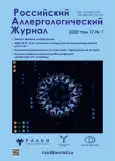Features of diagnostics and clinical approaches to case management of patients with hereditary angioedema without C1 esterase inhibitor deficiency. Analysis of the clinical case
- Authors: Fomina D.S1,2, Bobrikova E.N1, Serdotetskova S.A1
-
Affiliations:
- «Qinical State Hospital № 52»
- I.M. Sechenov First Moscow State Medical University (Sechenov University)
- Issue: Vol 17, No 1 (2020)
- Pages: 58-65
- Section: Articles
- URL: https://journals.rcsi.science/raj/article/view/121665
- DOI: https://doi.org/10.36691/RAJ.2020.17.1.006
- ID: 121665
Cite item
Full Text
Abstract
This article describes the clinical, biochemical and genetic features of hereditary angioedema (HAE) with normal level and functional activity of C1 esterase inhibitor. The discussion includes pathogenesis, diagnostics and case management of patients with hereditary angioedema without C1 esterase inhibitor deficiency. The materials of few scientific sources about patients with HAE without C1 esterase inhibitor deficiency in stages and our own clinical case (the female patient of fertile age with a confirmed mutation associated with factor XII (Hageman) deficiency) was given. The article describes the current state of the issue of the algorithm of primary diagnostics and differential diagnostics of HAE without C1 esterase inhibitor deficiency based on international and Russian data. It has been suggested that the new understanding of pathogenesis and treatment of patients with HAE without C1 esterase inhibitor deficiency is encouraging and becoming accessible to the medical society.
Full Text
##article.viewOnOriginalSite##About the authors
Daria S Fomina
«Qinical State Hospital № 52»; I.M. Sechenov First Moscow State Medical University (Sechenov University)
Author for correspondence.
Email: info@rusalljournal.ru
кандидат медицинских наук, главный аллергологиммунолог г. Москвы, доцент кафедры клинической иммунологии и аллергологии
Elena N Bobrikova
«Qinical State Hospital № 52»
Email: info@rusalljournal.ru
главный внештатный аллер -голог по Cеверному и СевероЗападному административным округам Москвы, зав. КДО Центра аллергологии и иммунологии ГКБ № 52.
Sofia A Serdotetskova
«Qinical State Hospital № 52»
Email: darklynx813@gmail.com
врач аллергологиммунолог КДО Центра аллергологии и иммунологии ГКБ № 52.
References
- Longhurst Н, Qcardi M. Hereditary angioedema. Lancet. 2012;379:474-481. doi: 10.1016/s0140-6736(11)60935-5.
- Banerji А, Yu Li et al. Hereditary angioedema from the patient’s perspective: А follow-up patient survey. Allergy Asthma Proc. 2018;39(3) 212-223. DOI: 610.2500/aap.2018.39.4123.
- Федеральные клинические рекомендации по диагностике и лечению больных с наследственным ангиоотеком (НАО). М., 2014. Доступно по: http://nrcii.ru/docs/nao.pdf. Ссылка активна на 12.12.2019 [Federal Qinical Guidline for diafnistics and treatment of patients with hereditary angioedema. М., 2014]. Available at: http://nrcii.ru/docs/ nao.pdf.
- Maurer M, Magerl M, Ansotegui I et al. The international WAO/EAAd guideline for the management of hereditary angioedema. The 2017 revision and update. Allergy 2018;73:1575-1596. doi: 10.1111/all.13414.
- Bork K, Barnstedt SE, Koch P, Traupe H. Hereditary angioedema with normal d-inhibitor activity in women. Lancet. 2000; 356(9225):213-721. doi: 10.1016/s0140-6736(05)74079-4.
- Binkley KE, Davis A 3rd. Clinical, biochemical, and genetic characterization of a novel estrogen-dependent inherited form of angioedema. J Allergy Clin Immunol. 2000;106(3):546-550. doi: 10.1067/mai.2000.108106.
- Walford HH, Zuraw BL. Current update oncellular and molecular mechanisms of hereditary angioedema. Ann Allergy Asthma Immunol. 2014;112:413-418. DOI: 10.1016/j. anai.2013.12.023.
- Kaplan AP, Joseph K. Pathogenic mechanisms of bradykinin mediated diseases: dysregulation of an innate inflammatory pathway. Adv Immunol. 2014;149:142-145. DOI: 10.1016/ B978-0-12-800100-4.00002-7.
- Kiss N, Barabas E, Varnai K, Halasz A, Varga LA, Prohaszka Z et al. Novel duplication in the F12 gene in a patient with recurrent angioedema. Clin Immunol. 2013;149:142-145. doi: 10.1016/j.clim.2013.08.001.
- Dewald G, Bork K. Missense mutations in the coagulation factor XII (Hageman factor) gene in hereditary angioedema with normal C1 inhibitor. Biochem Biophys Res Commun. 2006;343:1286-1289. doi: 10.1016/j.bbrc.2006.03.092.
- Marcos C, Lopez Lera A, Varela S, Linares T, Alvarez-Eire MG, Lopez-Trascasa M. Clinical, biochemical, and genetic characterization of type III hereditary angioedema in 13 Northwest Spanish families. Ann Allergy Asthma Immunol. 2012;109:195-200. doi: 10.1016/j.anai.2012.05.022.
- Bork K, Wulff K, Witzke G, Stanger C, Lohse P Hardt J. Antihistamine-resistant angioedema in women with negative family history: estrogens and F12 gene mutations. Am J Med. 2013;126:1142. doi: 10.1016/j.amjmed.2013.05.017.
- Bork K, Wulff K, Witzke G, Hardt J. Hereditary angioedema with normal C1-INH with versus without specific F12 gene mutations. Allergy. 2015;70:1004-1012. doi: 10.1111/all.12648.
- Bork K, Meng G, Staubach P, Hardt J. Hereditary angioedema: new findings concerning symptoms, affected organs, and course. Am J Med. 2006;119:267-274. DOI: 10.1016/j. amjmed.2005.09.064.
- Bork K, Wulff K, Witzke G, Hardt J. Treatment for hereditary angioedema with normal C1-INH and specific mutations in the F12 gene (HAE-FXII). Allergy. 2017;72:320-324. doi: 10.1111/all.13076.
Supplementary files






